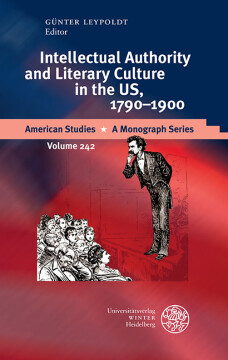
BUCH
Intellectual Authority and Literary Culture in the US, 1790–1900
Herausgeber: Leypoldt, Günter
American Studies – A Monograph Series, Bd. 242
2013
Zusätzliche Informationen
Bibliografische Daten
Abstract
This collection of essays contributes to the socio-institutional study of literary culture by looking at how writers, artists, and scholars in the United States assert their intellectual authority at various moments within the shifting cultural marketplace between 1790 and 1900. What do we mean when we speak of intellectual authority? How does the intellectual capability to make a difference relate to the nineteenth-century formation and differentiation of literary fields? How do literary intellectuals and their media partake in the economies of symbolic prestige that circulate between the local and transatlantic markets and institutions of Europe and the United States? The authors in this volume wish to inquire into the rituals of consecration and contestation that shaped the production of intellectual authority in the long nineteenth century.
Inhaltsverzeichnis
| Zwischenüberschrift | Seite | Aktion | Preis |
|---|---|---|---|
| Contents | v | ||
| Acknowledgments | vii | ||
| GÜNTER LEYPOLDT: Introduction: Intellectual Authority and Literary Culture | 1 | ||
| LAWRENCE BUELL: Inventing the Public Intellectual: Conflicting Models | 27 | ||
| CATHERINE O’DONNELL KAPLAN: Joseph Dennie, John Carroll, and the Quest for a Limited Authority | 45 | ||
| DIETMAR SCHLOSS: Shifting Positions: The Literary Intellectual in Charles BrockdenBrown’s “Walstein’s School of History” and Arthur Mervyn | 59 | ||
| JONATHAN ARAC: The Authority of the Novel within Literature andof Literature within Culture: An American Case | 83 | ||
| MARTIN KLEPPER: The Development of Literature as Art and the Authority of Fiction | 101 | ||
| JOHN EVELEV: Alternatives to Professional Autonomy: N.P. Willis andMargaret Fuller in the Antebellum American Literary Field | 115 | ||
| GÜNTER LEYPOLDT: Specters of Feminization in Nineteenth-Century Literary Culture | 141 | ||
| CHRISTA BUSCHENDORF: “Properly speaking, there are in the world no such men asself-made men”: Frederick Douglass’s Exceptional Positionin the Field of Slavery | 159 | ||
| ISABELL KLAIBER: Women Intellectuals in Nineteenth-Century Domestic Fiction | 185 | ||
| HERWIG FRIEDL: Out of Bounds: American Visions of the Thinker and of Thinking | 205 | ||
| MICHAEL ANESKO: Collected Editions and the Consolidation of Cultural Authority:The Case of Henry James | 219 | ||
| TIMO MÜLLER: “The Short Cut to Posterity”: Authority and Representation inHenry James’s Literary Tales | 245 | ||
| JAN STIEVERMANN: “A Blackguard’s Faulty Vision”: Ambrose Bierce’s ModernCynicism and Its Claim for Intellectual Authority | 259 | ||
| WINFRIED FLUCK: Thomas Eakins: Superiority and Inferiorityas Sources of Symbolic Capital | 289 | ||
| Index | 329 |


 Powered by CloudPublish
Powered by CloudPublish